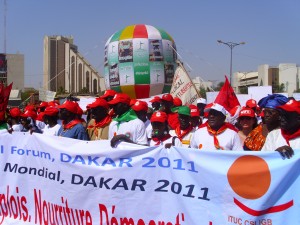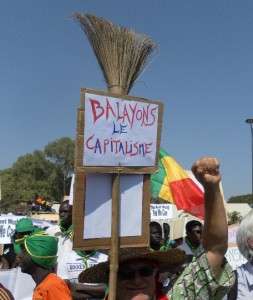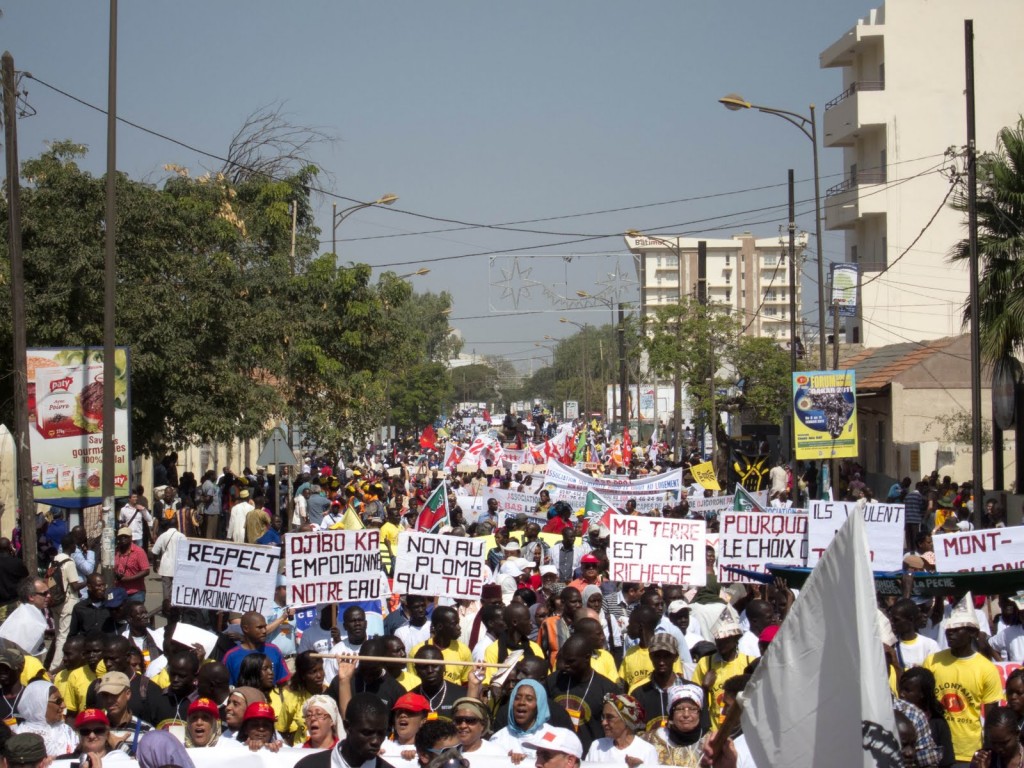Dakar 2011 Sound bites from the World Social Forum
New in Ceasefire, Politics - Posted on Friday, March 4, 2011 0:00 - 0 Comments
The eleventh edition of the World Social Forum (WSF) took place in the West African city of Dakar ended this month. Nakama Popoh visited Dakar, the third WSF to take place on the African continent after Bamako in 2006 and Nairobi in 2007.
A place of critical debate and exchange
The forum got off to a good start as an estimated 60’000 people took to the streets for the inaugural march on the 6th of February. Participants walked in the scorching heat of the Teranga holding banners and cardboards bearing messages of condemnation, frustration….and hope. Although it was discernable that the majority of the marchers consisted of activists from urban Senegalese social movements, other marchers from various international movements successfully blended into the masses of people to form a buoyant crowd marching to the sounds of drums and chants. Participants poured in from all continents, age groups, religions, political persuasions and working backgrounds.
As the marchers arrived at the Université Cheick Anta Diop (where the forum was held) Bolivian president Evo Morales addressed the crowd in a message that conveyed the idea that yes, “another world is possible” echoing the WSF’s much-repeated motto.
This year’s central topic was the “Failure of the capitalist system” and to give credence to the latter the debates and conferences tackled issues such as debt cancellation for the Global South, tax justice, food sovereignty, South-South cooperation, women’s empowerment and of course the thrilling waves of revolutions that have been sweeping through the Arab world.
As was expected participants enjoyed the presence of world-renowned academics and politicians such as anti-imperialist Samir Amin (who animated many panels), the renowned Senegalese academic Demba Moussa Dembele and former Brazilian president Inacio Lula Da Silva to mention but a few. Participants also met in the presence of more controversial characters like the French socialist Martin Aubry and the president of the hosting country Abdoulay Wade.
Well-know groups such as the Gaza Flotilla Movement, Tax Justice Africa, Oxfam, Survie and many others came to present their respective projects and to rally activists to their cause.
 Despite the goodwill of participants and many volunteers, the forum ran into some logistical problems. Regardless of the promise made by the university director to make lecture halls available for the forum’s conferences, the reality on the field told another story as participants turned up to either occupied amphitheatres or closed doors where debates had been scheduled. However, activists always being resourceful and showing great improvisational skills, put up tents in no time next to the university to host events that could not take place in the amphitheatres. The discussion panels were therefore, in most cases, successfully carried out in several languages with the presence of interpreters.
Despite the goodwill of participants and many volunteers, the forum ran into some logistical problems. Regardless of the promise made by the university director to make lecture halls available for the forum’s conferences, the reality on the field told another story as participants turned up to either occupied amphitheatres or closed doors where debates had been scheduled. However, activists always being resourceful and showing great improvisational skills, put up tents in no time next to the university to host events that could not take place in the amphitheatres. The discussion panels were therefore, in most cases, successfully carried out in several languages with the presence of interpreters.
Undercover cops at the behest of the Moroccan and Algerian governments?
It was acknowledged by the Senegalese organising committee that both the Algerian and Moroccan governments had funded part of the WSF in return for the right to send undercover police agents. According to the rumours that circulated during the forum the Algerian and Moroccan governments would have secretly agreed the terms for these undercover agents with the Senegalese government. This could have been a desperate act by the Moroccan and Algerian governments to curtail all ideas of revolution from gaining momentum in their respective countries.
Indeed, the presence of a large Moroccan delegation had attracted the attention of many participants, with some already suspicious of involvement by Moroccan government. Suspicions became clearer when a large crowd of people bearing Moroccan flags scurried into a conference room where a discussion panel on the Moroccan occupation of the Saharaoui people was about to take place. The events that followed the interruption confirmed many people’s concerns, as some of the panellists were physically attacked and robbed of their possessions. Of course much of the violence was purposefully directed towards the Saharaoui women who did not hesitate to stand up for their dignity and beliefs. The organisers of the World Social Forum openly condemned the act and expressed their solidarity for the Saharaoui people in the 2011 WSF’s final declaration.
Strong represention for tax justice and debt cancellation campaigners
Tax justice and debt cancellation were a big issue during the forum. Oxfam and Tax Justice Network presented their works on the importance of taxes in state building and the present threat of tax evasion and tax exemptions in mineral rich countries. The ‘resource curse’ has its roots in the unfair tax system that exonerates multinational firms from tax payments. This trend has become commonplace in poor countries with the World Bank and the IMF having constructed the ideology behind tax amnesty in the 1980s. This period witnessed the softening of fiscal policies and environmental laws intended to create “attractive” investment conditions for foreign investors.
Participants in the various panels that addressed the issues of tax justice gave an account of what was happening in their respective countries. In Cameroon, Congo, Côte d’Ivoire or Ghana, the story is quite similar. Governments and multinationals are colluding together to leave tax policies as opaque as possible, to the detriment of local citizens.
To fight this trend, a coalition of organisations have joined forces to launch a campaign hoping to attract as many activists as possible to sign a global petition to present at the 2011 G20 summit in Paris. The goal is to have as many people as possible sign the petition that calls against tax haven secrecy. Tax havens have allowed multinationals to dodge taxes and has successfully siphoned away an estimated $ 385 billion a year from developing countries. By and large ,this amount dwarfs any financial aid granted to developing countries.
 The endtaxhavensecrecy campaign hopes to force world leaders to put the matter of tax justice on the agenda at the next G20 summit. However, the fight against tax havens and tax evasion will be a protracted one because the governments of developing countries themselves have been at best ignoring the issue and at worst perpetuating it themselves.
The endtaxhavensecrecy campaign hopes to force world leaders to put the matter of tax justice on the agenda at the next G20 summit. However, the fight against tax havens and tax evasion will be a protracted one because the governments of developing countries themselves have been at best ignoring the issue and at worst perpetuating it themselves.
Other organizations linked up to the fight against tax evasion through the campaign for third world debt cancellation. The presence of both African and Latin American organizations militating against the mechanisms of financial aid and the unsustainable debt that they imply was strongly felt.
In their panels they discussed the illegitimacy of many of the creditors and the roles foreign aid played in corruption practices and military coups.
The message from the latter organizations was clear and simple: It is up to civil society to take up these matters and force, governments, multinationals and international financial institutions to respect their rights.
The Forum’s closing moments: The struggle continues
This eleventh edition of the WSF closed with the publication of the final declaration of the Social Movement Assembly composed of the very people who participated in the forum.
All in all the WSF, despite some organizational blunders, proved to be a thrilling success. Much entertainment was provided during the six days of the forum. It was also an excellent occasion for participants and visitors to discover the various foods, music and artefacts on sale in the stalls installed by traders, associations and cooperatives. This cultural exchange strengthened the political links which were built during the more formal meetings.
Participants walked away with the satisfaction of having exchanged experiences of their fights against capitalism. With the exceptions of the more cynic ones the idea that another world is possible stays engraved in the heads of those who took part in the Dakar forum and remains an objective to attain.
Nakama Popoh is an activist and participant at the 2011 Dakar Forum.



Leave a Reply